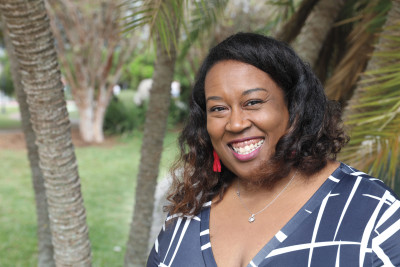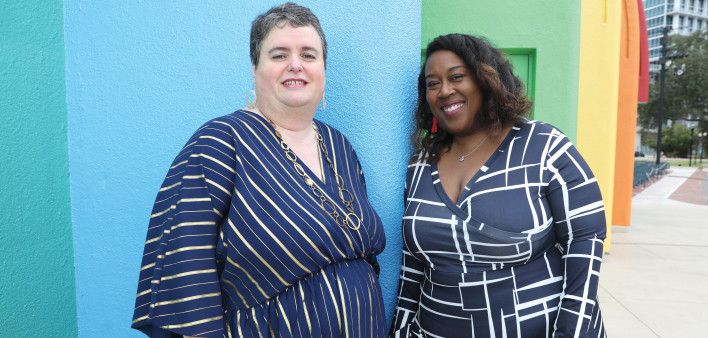For a decade, the pioneering Sero Project has led the push for the repeal—or at least the modernization—of outdated laws that criminalize people living with HIV for having sex without disclosing their status, even in cases where HIV is not transmitted. The national nonprofit does serious work. If Sero’s story were to be dramatized, its tale could be told in two chapters.
The first chapter, “When Sean Met Tami,” would take place in 2013. That’s when Iowa native Sean Strub met fellow Iowan Tami Haught. Strub, who has been living with HIV since the 1980s, founded POZ magazine in 1994 and sold it a decade later. Haught was diagnosed with HIV in 1993, a day before her 25th birthday, and had since become involved in HIV activism in Iowa, including advocating for more funding for the AIDS Drug Assistance Program (ADAP) in the mid-2000s, when more than 108 Iowans were on the ADAP waiting list to access HIV meds.

Sean Strub, founder of POZ and the Sero ProjectBill Wadman
Strub’s anger at the injustice of HIV criminalization laws—many of which apply even if HIV is not transmitted and focus on the accusation of nondisclosure, which is hard to prove—led him to launch Sero in 2012. He asked Haught to coordinate Sero’s first HIV Is Not a Crime (HINAC) conference at Iowa’s Grinnell College in 2014. And she did.
That was also the year that Iowa—thanks to a coalition led by Haught—became the first state since the founding of Sero to modernize its HIV criminalization law by factoring in an undetectable viral load or the use of a condom into a case and increasing the burden on the prosecution to prove that the person with HIV demonstrated an intent to transmit HIV—a high bar to clear. The modernization also removed from the state sex offender registry everyone who had been placed on it due to an HIV crime.
The second chapter, “When Tami Met Kamaria,” would take place shortly after, in 2016, when Florida’s Kamaria Laffrey—who was diagnosed with HIV in 2003 and subsequently became a local activist, speaking at National Black HIV/AIDS Awareness Day events and fighting the era’s ADAP shortage in her state—attended the second HINAC conference in Alabama.
“I went and never looked back,” Laffrey says. Back in Florida, she led a coalition to decriminalize HIV in her state—the effort is ongoing—and in 2017 joined Sero’s full-time staff.
In May, Strub will retire as Sero’s founding executive director and become a senior adviser, while Haught and Laffrey, currently co–managing directors, will become co–executive directors.

Attendees of the HINAC3 conference
Haught and Laffrey have their work cut out for them. As of the summer of 2022, according to the Center for HIV Law and Policy (CHLP), 30 states still have HIV-specific criminal laws or sentence enhancements applicable to people living with HIV.
However, it’s also true that over the past decade, 13 states have reformed or repealed one or more parts of their HIV-specific crime laws. (Texas, somewhat notably, repealed its HIV-specific crime law back in 1994.)
That’s a lot of hard-won legislation in only a decade. Sero has had a guiding hand in all of it. It has nurtured coalitions of people living with HIV and their care and service providers and other allies and urged each coalition to push for the changes it felt were within reach for a particular state. “It’s a different strategy in every state,” says Strub. “No one state becomes the model, because each has its own political realities.”
Sero has amassed many partners and admirers over the years. “They’ve been an amazing model of courage,” says Charles Stephens, founder and executive director of The Counter Narrative Project, which works to create better attitudes toward and policies benefiting Black gay and bisexual men, including HIV decriminalization. “They’ve built a movement, raised awareness and changed laws.”
Stephens particularly applauds Sero’s focus on the disproportionate impact of HIV crime laws on Black people, especially Black gay men. “In HIV criminalization, we can really see how the forces of racial disparities in the criminal justice system converge,” he says. “We have to address criminalization as a racial justice issue.”
Sero has also been instrumental in putting people living with HIV at the forefront of decriminalization efforts, says Naina Khanna, co–executive director of Positive Women’s Network–USA (PWN-USA), which has often collaborated with Sero, including on the HINAC conferences, since 2016.
“They’ve centered the voices of survivors of HIV criminalization, making sure that their stories and priorities are reflected in our efforts to abolish these laws,” Khanna says. She also says Sero introduced the state-by-state strategy of changing laws, helping nurture coalitions in each state as early as the first HINAC conference in Iowa, when it asked groups from each state to announce aloud what their next steps would be once they returned home.
“Nobody had been doing that before,” she says, “especially while making sure that people living with HIV, not just lobbyists from big organizations, were prioritized in the process.”
In the broadest sense, Sero has played a huge role in a social trend away from the attitudes of the 1980s and ’90s—when people living with HIV were largely seen as dangerous and rarely were given the benefit of the doubt in an HIV criminalization case—and toward an era of greater understanding that people on effective treatment do not transmit HIV through sex and that the vast majority of people with the virus do everything possible not to expose their sexual partners, even if not all of them disclose their status before sex.
“It’s been a huge learning curve and helped me identify a fire inside me that I didn’t know I had,” says Laffrey of her Sero experience. “If anyone had come to me a decade ago and told me I’d be doing this work, I’d have laughed in their face.”
When Sero was founded in 2012, hundreds, perhaps thousands, of Americans living with HIV—it appears that no one has an exact number—had been prosecuted under HIV-specific statutes since states began instituting them in the AIDS-phobic mid-’80s.
“I was alarmed by the growing stigmatization and criminalization of people living with HIV, along with the declining strength of networks of people with HIV” with every passing year of better antiretroviral treatment, says Strub. After starting the anti-criminalization Positive Justice Project with CHLP, Strub realized “actual people living with HIV needed an institutional voice in the movement, like a labor union,” he says.
Strub particularly wanted to center the voices of people living with HIV who had been prosecuted, so he reached out to three such individuals: Robert Suttle in Louisiana, Nick Rhoades in Iowa and Monique Howell in South Carolina. A grant from Broadway Cares/Equity Fights AIDS (BC/EFA) allowed Strub to produce the eight-minute documentary HIV Is Not a Crime, which became Sero’s most valuable teaching tool.
The film showed how the three of them were living under suffocating legal penalties and stigma despite not having transmitted HIV to their partners. The doc included a shot of Suttle’s driver’s license with “SEX OFFENDER” stamped across it in large red letters.
Funds from BC/EFA, the Elton John AIDS Foundation and the philanthropist Henry van Ameringen allowed Strub to produce an informational brochure, hire two interns and start speaking at colleges, universities and law and medical schools about HIV crime laws. “People didn’t even know what the phrase ‘HIV criminalization’ meant, and many of them, when they first learned of the statutes, believed they served a purpose,” he says.

A promotional poster from Sero
In 2013, a research working group on HIV criminalization funded by the National Institutes of Health concluded: “Findings from empirical studies on the impact of these laws suggest that they do not decrease HIV infections or have any other positive public health impacts.”
By the time Strub brought Haught into Sero, she had already started the coalition that led to the modernization of Iowa’s HIV law in 2014. To celebrate the law change, including its removal of those harmed by it from the state’s sex offender registry, a reception was held at the first HINAC conference during which the law change’s legislative champion, state Senator Matt McCoy, used a bolt cutter to remove the sex offender ankle bracelet that Rhoades had been forced to wear.
“Watching that was very moving, nourishing and inspiring” for the budding movement, recalls Strub. “There was an ecstatic reaction in the room.” Recalls Haught: “That will always be the greatest advocacy moment in my life, along with getting emails from other Iowans who’d left the state and were removed from offender registries in their new state, where they’d been required to register after Iowa.”
But as much as the new Iowa law put the burden of proof of “intention to transmit” on the accuser rather than the accused—an important change, to be sure—it retained “exposure with intent to transmit” as a felony charge and “exposure with reckless disregard” as a felony if transmission occurred and a misdemeanor if not.
It was an early lesson for Sero that such laws would be easier to modernize than outright repeal, which since 2014 has happened in only two of the 14 states where law changes have occurred—Illinois in 2021 and New Jersey in 2022.
Galvanized by Sero’s biennial HINAC conference, coalitions of people living with HIV and their allies, including service providers and public health professionals, did indeed manage to modernize and soften laws—not only in Iowa (2014), but in Colorado (2016), California (2017), Michigan, Louisiana and North Carolina (2018), Washington (2020), Missouri, Virginia, Illinois, Indiana and Nevada (2021) and Georgia and New Jersey (2022).
“When COVID hit and we were all sheltering in place, figuring out what we were going to do, advocates were still meeting virtually with legislators” and changes still went through, recalls Laffrey. “That kept me from falling under. Whenever I thought, This is too hard, our advocates were relentless, which makes me so damn proud to be a part of this movement.”
She particularly remembers the exhilaration of the legislative vote in Virginia, which came down to the wire. “We each had a chunk of a long list of lawmakers we needed to reach out to over a weekend via phone and email—then waiting on that Monday to find out how the vote was going. It was an adrenaline rush. Folks want to put their hands on something, and you don’t always get to feel you’re making the sausage like that. Usually, you do community engagement, make a move and wait—but it’s exciting when you finally get the bill on the table, and it’s all hands on deck.”
At the heart of efforts in every state, says Strub, “you have to explain to people what HIV criminalization actually is, which is the inappropriate use of one’s HIV status in a criminal prosecution. Most people don’t think there should be special crimes for people based on an immutable aspect of them, like their gender or race—but with HIV crime laws, we’re doing just that.”
The differences between possible exposure, intent and transmission are not considered.
But, he adds, “Ultimately, the most persuasive argument isn’t human rights, but public health. There’s zero evidence that these laws reduce HIV transmission.” On the contrary, he says, “We showed how these laws discourage people from getting tested for HIV,” because people fear that if they know they are HIV positive, it could be held against them in a legal proceeding.
Strub and other decriminalization advocates take pains to point out that the rare cases that result in HIV transmission or indicate malicious intent, sometimes involving several sexual partners, can be prosecuted under non-HIV-specific statutes, such as assault or reckless endangerment. They say that part of their work is trying to explain to people who contracted HIV from a partner who knew they had it—people who are understandably angry—why they should not press charges under HIV-specific laws.
“They feel a real harm has been done to them, and you have to let them feel that,” says Haught, whose HIV was transmitted by her husband, who died of AIDS in 1996. “But we encourage them to stop and think before they act, because many of them press charges and then feel they made a mistake when they see that the case is out of their hands with the prosecutors.”
Adds Laffrey: “I’ve known of women who felt, This person gave me HIV, and they must be arrested because they didn’t tell me. I ask them to consider the implications of these laws. I ask, ‘Do you know they could be used against you?’ The differences between possible exposure, intent and transmission are not considered. It could turn your life upside down.”
Sero has much work still to do in its second decade—including fighting off new HIV crime laws, such as the one some parties in Texas have been trying to pass during the past few years, as well as further softening or fully repealing laws that have already been modernized. Current grants from drugmakers Gilead Sciences and ViiV Healthcare as well as the nonprofit Wellspring Philanthropic Fund should go a long way toward furthering some of these goals.
Also important, says Haught, is the creation of more storytelling vehicles for the decriminalization movement, such as the short but powerful HIV Is Not a Crime documentary that got Sero started. “I want to tell the story of our success in various states so advocates pushing for law changes in other states can learn from them,” she says.
As for more state law changes, Sero is keeping an eye on Tennessee, which will likely reintroduce a decriminalization bill, as well as on Ohio and Indiana. Also still in play is the push to pass the federal REPEAL HIV Discrimination Act—long sponsored by U.S. Representative Barbara Lee (D–Calif.)—which would have no teeth but would give states guidance on reexamining their HIV-specific crime laws.
Strub says Florida’s law will be a particularly tough nut to crack. “Usually, we feel apathy from legislators, but in Florida, we feel actual cruelty—anything to stick it to people living with HIV, Black people, queer people, just for its own sake.” He holds out hope because of the ground being laid there: “We’ve done so much organizing there, which shows you can make progress even in some of the bleakest political environments.”
Regardless of what the future holds, Sero’s principals all say the work has been transformative for them. “This is personal for all of us, for the burden of proof not to be on us,” says Haught. “We’ve had the honor of meeting survivors of criminalization, and, though the work can be emotionally draining, seeing how survivors continue to fight against incredible odds gives us strength.

Tami HaughtOctavio Jones

Kamaria LaffreyOctavio Jones
Khanna says that, as Strub fully hands over the reins to Haught and Laffrey, “I’d love to see from Sero an ongoing commitment to elevate and center racial justice, to think about how anti-Black racism, xenophobia and anti–sex work policies intersect” with efforts to soften or repeal HIV criminalization laws. “They’re already taking some great steps in that direction.”
Laffrey says being part of Sero “has really strengthened my view as a Black woman of my capabilities and how I can show up and hold myself accountable. I’m in a better position to support my community in a meaningful way. I lost my husband just before COVID hit, and I was in a very ‘I don’t give a damn’ space, but when I see other advocates say, ‘We have to keep at this because we’re worth it,’ that keeps my head above water.”
As for Strub, though he’s stepping down from Sero’s top position, he has no plans to step back from the work—especially as it becomes global, with organizations, including Sero, collaborating with the group HIV Justice Worldwide to soften or undo HIV criminalization laws around the world.
“This work has been incredibly satisfying personally,” he says. “And a lot of that is driven just by the inspiration and encouragement I get from people with HIV finding their voice, getting involved and realizing they have more power to influence policies that directly affect their lives than they realized.”
Go to SeroProject.com to find out how to get involved.
Correction: The print version of this article incorrectly stated that more than 1000 Iowans were on the ADAP waiting list in the mid-2000s.







Comments
Comments